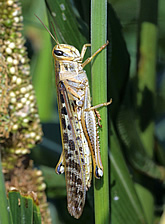This page has been archived and is being provided for reference purposes only. The page is no longer being updated, and therefore, links on the page may be invalid.
|
|
|
|
New Plant-Insect Interaction Discovered
By Sharon DurhamAugust 15, 2007
A new class of compounds has been discovered that should help shed more light on how plants respond to insect attacks. Agricultural Research Service (ARS) scientists with the Center for Medical, Agricultural and Veterinary Entomology (CMAVE) in Gainesville, Fla., along with colleagues at the Virginia Military Institute and the Pennsylvania State University, isolated the compounds from oral secretions of Schistocerca americana grasshoppers fed corn seedlings.
Plants, and the insects that feed on them, engage in a relationship involving many resultant hormonal and chemical changes in the plant, including induced production and emission of volatile organic compounds, or VOCs. These physiological changes, brought about by a group of compounds known as elicitors, vary—not only for different plants, but also with the insect species feeding on a plant. Understanding the plant- insect interaction is important in crop science and insect pest management.
ARS chemist Hans T. Alborn, in CMAVE's Chemistry Research Unit, led the team that isolated the previously unidentified class of compounds. They named them caeliferins because preliminary analyses of oral secretions collected from several species of Orthoptera (grasshoppers, katydids and crickets) indicated that the compounds may be present in most, if not all, grasshoppers—members of the suborder Caelifera—but not in crickets or katydids in the suborder Ensifera.
The caeliferins that Alborn isolated have some unique properties, so they should provide new biological tools and directions for exploring the physiological ecology of, and interactions between, insects and plants. Interestingly, the pattern of caeliferins may determine whether S. americana grasshoppers are solitary or gregarious. If so, the compounds may be found to influence swarming behavior of locusts.
The CMAVE scientists study elicitors of plant volatile releases to find ways to induce defensive responses to help crop plants under insect attack remain healthy and vigorous. It’s well known that insect chewing may induce release of plant VOCs that summon natural enemies of the attacking insects. But insects’ oral secretions may also provoke direct plant defenses that impair the pests’ performance.
ARS is the U.S. Department of Agriculture's chief scientific research agency.

